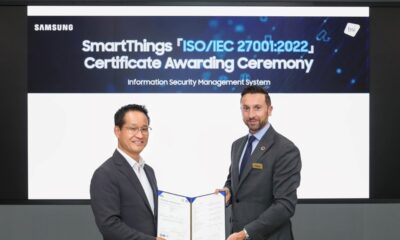News
Meet new Samsung executive team to transform vision of the world technology

Samsung’s DRAM drives innovation and accelerates the performance in various computing solutions, from PCs to servers for advanced AI applications. This technology transfer a wide range of high-performance service for system efficiency.
Samsung Electronics just unveiled a multi-chip package (MCP) sample that stacks a 64MB NAND flash memory as well as a low power-consuming 32-megabit Uni-transistor (Ut) RAM. Moving on, the company has started shipping samples to mobile handset manufacturers.
However, Samsung forecasts its sales in the data storage market can alone reach $800 million this year. For the upcoming year, the company aims to be among the world’s top five flash memory makers.
Recently, Samsung has selected new executives for the foundry and memory businesses, as part of a year-long reorganization. The company has announced that Choi Si-young will be the new head of their foundry business and Lee Jung-bay the new CEO of the memory business unit.
Read More: Samsung One UI 3.0/Android 11: Official Roadmap and Eligible Devices

Moreover, Dr. Jung has played a crucial role in developing many innovative technologies that greatly increased Samsung’s leading position in the semiconductor market. Choi Ji-young was previously head of the Samsung Memory Manufacturing Technology Center.
With the advanced technologies developed under his leadership, Samsung was able to become the first in the industry to mass-produce 20nm and 10nm-class DRAM, 3D Vertical NAND, and SoCs based on 14 and 10nm FinFET process technologies.
Dr. Jin has progressed through key technical and leadership positions across Samsung’s memory business and successfully led the development of numerous flagship memory products and technologies.
He has been responsible for bringing key next-generation memory technologies to market and directing the development and commercialization of industry-first DRAM processes from the 80-nanometer (nm) class up to the 10nm-class generation.
The South Korean tech giant has not replaced its three co-CEOs, indicating market possibilities. Under Dr. Kim’s leadership, Samsung’s memory business continues to maintain its top market share and technology leadership with first-to-market products in DRAM, NAND flash, and solid-state drives (SSD) for more than a decade.
After joining Samsung Electronics in 2010 as a chief director at the DMC lab in San Diego, he has been working at Samsung as executive vice president in charge of R&D and commercialization of cellular baseband/RF chipsets, as well as software for 2G, 3G, and 4G. Similarly, Samsung will be announcing an executive-level reorganization in the coming days.
News
Here’s why Google Messages replaced Samsung Messages on Galaxy devices

Samsung’s latest foldable phones come with Google Messages by default. The company has now revealed the reason behind this move on Galaxy devices. Samsung says Google Messages replaced Messages to foster RCS adoption.
According to AndroidAuthority, a source explained Samsung’s decision to switch to Google Messages as the default messaging app. The recently released Galaxy Z Flip 6 and Z Fold 6 come with Google Messages with RCS enabled by default.
Looks like promoting Google Messages on Galaxy devices will boost RCS adoption. Samsung Messages isn’t already installed on newer phones. However, one’s stopping you from getting it on your Galaxy from the Galaxy Store.
While many apps support the RCS feature, Google Messages offer the best user experience. Making it a default messaging app is an effort to boost the adoption of RCS tech. Apple is also preparing to bring RCS chat functionality to iMessage for iPhones.
What Samsung source said:
- Even if messaging apps follow the RCS standard, the availability may be limited depending on which app the other party uses. That’s why we decided to make Google Messages the common messaging platform, allowing Galaxy users to communicate more freely. This also enables a messaging app to respond to changes of the RCS standard more quickly and efficiently.
Previously, Samsung devices launched in the US came with two messaging apps. This time, the company has removed the Samsung Messages. During the first setup, users are notified that Google Messages is the default messaging application.
News
Samsung SmartThings gets ISO 27001 certified

Samsung SmartThings gained the international standard ISO/IEC 27001:2022 certification. The company has officially announced this major development in its global connected living platform.
SmartThings received ISO/IEC 27001:2022 certification for information security management systems. Certification reiterates that the SmartThings Cloud operates per international standards.
To be certified, a company has to meet the standard across a total of 123 detailed items, including policies for information security, access control for information assets, and incident response.
SmartThings receiving the ISO 27001 certification is the result of our sustained focus on the protection of information in a hyper-connected world with exponentially increasing intelligence.
Seungbum Choi, Executive Vice President and Head of Device Platform Center at Samsung Electronics said “this is just another step in our drive to fortify the platform’s security. We will continue to find new ways to ensure that SmartThings’ personalized services are provided even more safely.”

BSI Prez says that they have recognized that the operation capability and security level of Samsung SmartThings is excellent. It will further boost trust in the SmartThings platform and strengthen business competitiveness.
ISO 27001 is the leading global standard for ISMSs and was established by the International Organization for Standardization. It provides companies with guidance to manage the risks to information assets systematically and achieve information protection goals.
News
Dr.diary fuels Samsung Health with glycated hemoglobin algorithm
Samsung Health app integrated the Dr.diary (Doctor Diary) glycated hemoglobin feature. The blood sugar management platform announced the launch of its glycated hemoglobin estimation functionality on Samsung’s Health application.
According to ETNews, Dr.diary announced the integration of a glycated hemoglobin level feature in Samsung Health. Galaxy users will now be able to check the estimated glycated hemoglobin level provided by Doctor Diary.
To activate the feature, Health app users will have to permit certain conditions of data in the Blood Sugar service. It is worth noting that glycated hemoglobin is a key figure for diabetes diagnosis, which users will find worth using in the Health app.
Established in 2017, Dr.diary is a blood sugar management platform. It analyzes and predicts the changes in glycated hemoglobin using its own algorithm. Earlier this year, the firm secured a patent for “glycated hemoglobin estimation based on blood sugar data table.”
Song Je-yoon, CEO of Doctor Diary, said, “With our predicted glycated hemoglobin level prediction algorithm being installed in Samsung Health, more people will be able to recognize their glycated hemoglobin level and manage their health more efficiently.”

Glycated hemoglobin (HbA1c) is a standardized numerical value of the percentage of hemoglobin, such as hemoglobin, which has been glycated by glucose. Glycated hemoglobin reflects the average blood sugar level over the past 2-3 months.
Samsung Health (with Wear OS Galaxy Watch) users can conveniently check their estimated glycated hemoglobin level within the app and use this information to manage their blood sugar levels through diet and exercise.












